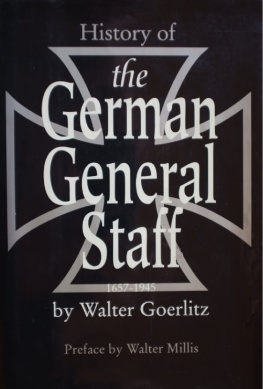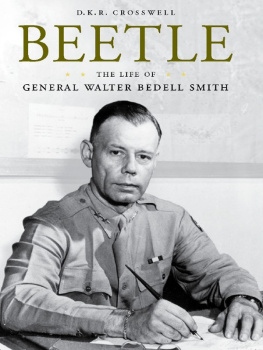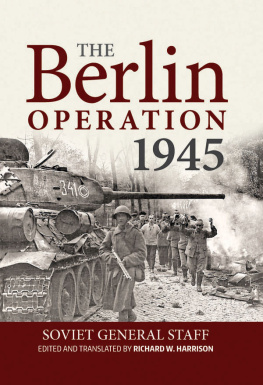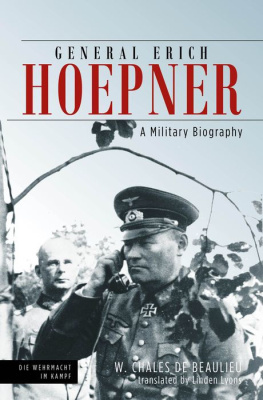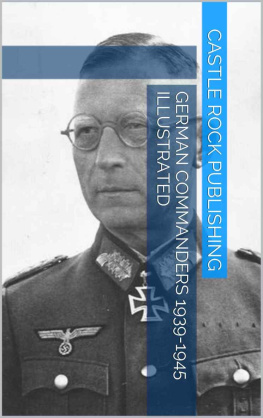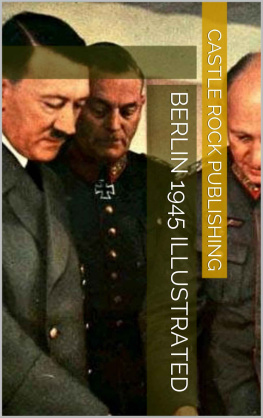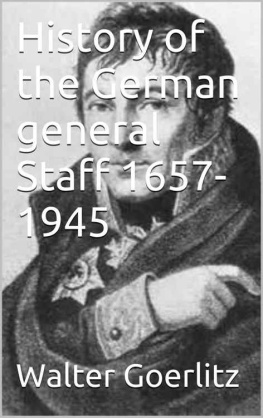Walter Görlitz - History of the German General Staff 1657-1945
Here you can read online Walter Görlitz - History of the German General Staff 1657-1945 full text of the book (entire story) in english for free. Download pdf and epub, get meaning, cover and reviews about this ebook. year: 2015, publisher: Pickle Partners Publishing, genre: History. Description of the work, (preface) as well as reviews are available. Best literature library LitArk.com created for fans of good reading and offers a wide selection of genres:
Romance novel
Science fiction
Adventure
Detective
Science
History
Home and family
Prose
Art
Politics
Computer
Non-fiction
Religion
Business
Children
Humor
Choose a favorite category and find really read worthwhile books. Enjoy immersion in the world of imagination, feel the emotions of the characters or learn something new for yourself, make an fascinating discovery.
- Book:History of the German General Staff 1657-1945
- Author:
- Publisher:Pickle Partners Publishing
- Genre:
- Year:2015
- Rating:4 / 5
- Favourites:Add to favourites
- Your mark:
- 80
- 1
- 2
- 3
- 4
- 5
History of the German General Staff 1657-1945: summary, description and annotation
We offer to read an annotation, description, summary or preface (depends on what the author of the book "History of the German General Staff 1657-1945" wrote himself). If you haven't found the necessary information about the book — write in the comments, we will try to find it.
History of the German General Staff 1657-1945 — read online for free the complete book (whole text) full work
Below is the text of the book, divided by pages. System saving the place of the last page read, allows you to conveniently read the book "History of the German General Staff 1657-1945" online for free, without having to search again every time where you left off. Put a bookmark, and you can go to the page where you finished reading at any time.
Font size:
Interval:
Bookmark:


This edition is published by PICKLE PARTNERS PUBLISHINGwww.picklepartnerspublishing.com
To join our mailing list for new titles or for issues with our books picklepublishing@gmail.com
Or on Facebook
Text originally published in 1953 under the same title.
Publishers Note
Although in most cases we have retained the Authors original spelling and grammar to authentically reproduce the work of the Author and the original intent of such material, some additional notes and clarifications have been added for the modern readers benefit.
We have also made every effort to include all maps and illustrations of the original edition the limitations of formatting do not allow of including larger maps, we will upload as many of these maps as possible.
History of the German General Staff 16571945
By
Walter Goerlitz
Contents
By Walter Millis
To two generations of Americans the German General Staff has stood as an object of hatred, fear and revulsion. In the two greatest of our wars Germany was our principal opponent; twice in a lifetime we have seen our normal world, if not our national existence itself, imperilled by her formidable and ruthless armies. Through the whole thirty years from 1914 to 1945 we were to live more or less under the shadow of the grimly expert, professional militarism by which those armies were leda tradition nurtured, and in the worlds eyes personified, by the German Great General Staff.
This remarkable organization seemed so much a thing of evil in itself that its extirpation became a chief object of the Treaty of Versailles. Duly it was abolished, and Germany forbidden ever to recreate such an instrument of military power; apparently, the only result was that twenty years later it was functioning as it always had, managing still greater armies, launching them with still greater precision and more deadly effect upon a shattered world society. The General Staff, which traced its origins to the armies of Frederick the Great, did not finally cease to exist until that apocalyptic moment in the ruins of the Reichskanzlei, when Germany was at last left without an army of any kind through which it might operate.
That it had left an indelible impress upon our national life, our history and our future was obvious enough. Less obviousand certainly far less clearly understoodwas the earlier influence which it had exerted upon our own institutions, in common with those of Western society as a whole. In the late Nineteenth Century it was far from seeming the evil power which it was later regarded as being; in the days of the elder Moltke it was, rather, a model, earnestly imitated by all the greater nations as they sought to bring their military systems and policies into line with the revolutionary changes which sociology and technology were working in the ancient art of war.
The Napoleonic era had posed, or clearly foreshadowed, certain fundamental military problems of great complexity. It had combined the invention of the democratic, popular mass army with the beginnings of a technological revolution which was to make possible the mobilization, supply, deployment and maneuver of such masses on an unparalleled scale. Both the ideological foundations and the technical apparatus had been provided for a total outpouring of the national energies in war to an extent which would have seemed incredible even as late as the mid-Eighteenth Century. How were such tremendous potential forces to be controlled; how were they to be commanded; how, in particular, were they to be related to the political and social ends of the state, which they were supposed to serve?
It was still just possible in Napoleons time for individual genius (aided by such improvisations as the divisional system of command and the embryonic staff officer) to direct the new forms of military action which were coming into existence; but even with genius available, the results were not too happy. And a generation later it was already apparent to the thoughtful that something else would have to be developed to meet the growing problem of generalship in the modern technological state. The inevitable answerin war as in commerce, industry or civil public administrationwas system, organization and specialized training. And, rather curiously, it fell to the Prussian general staff, itself already an anachronism in more ways than one, to provide that answer in what for nearly a century was to seem its most efficient practical form.
The Prussian staff, as the opening sentences of this book observe, was a product of a specific phase of European development. It grew out of that combination of absolute monarchy with standing armies which became so typical a phenomenon after the Thirty Years War. But perhaps it was just because the roots of the institution ran so deep in an ordered past, that it survived into the tempestuous future of the Nineteenth Century as an example on which nearly every great military powernot only in Western Europe but in Japan and the United States as welltended to model its military policies and systems.
Not a few of the basic precepts and traditions worked out by the Prussian and later the Ge man Great General Staff were to enter into the military thought of every major military power. The traditions of an almost monkish divorcement of military policy from political affairs, of thorough preparatory planning for every possible military eventuality (without regard for the influence which the military plan might have on the political crisis), of corporate anonymity in planning and command but of the highest level of individual competence and responsibility within the corporate leadership, of the strictest moral and intellectual and also caste standards maintained within the framework of selfless devotion to the sovereign and the statethese were the traditions and the principles developed by the German General Staff through the Nineteenth Century as answers to the basic problems of military command in the democratic-capitalist technological society of the times.
That the answers did not work too well is painfully obvious in the light of later knowledge. But that they were widely admired and imitated is indisputable. The anonymous but overriding authority of the Staff, the secret preparation of war plans, the division of Staff responsibilities and labors, the incorporation of technological advance into military practice through Staff study, channelling and guidance, all became standard practice in the world that came up to catastrophe in 1914, and much of it is standard practice still. While the United States had during most of the Nineteenth Century remained outside the main lines of European military development, it was to the German General Staff that we turned for example when, after 1898, we realized that we would have to modernize our military system. And the staff method of organization, largely based on the German model, which Elihu Root instituted in our own Army in the Theodore Roosevelt era, remains to this day the basis of American military command and military policy formation.
The history of the German Great General Staff has been a great and pregnant influence in the affairs of Western Europe and America over at least a century and a half. Yet it is a history which few Americans understand or are even aware of. It is believed that this translation and condensation of Walter Goerlitzs massive account is the first book to appear in English which deals at all adequately with the subject. Actually, it is at once rather more and perhaps somewhat less than its title suggests. The authors approach is not through the technics of organization or even of plan, but through the succession of great and near-great or sometimes inferior personalities who, together with the social and economic backgrounds which produced them, made up the story. This is not an analysis of how the Oberquartiermeister functioned in 1699 or of just how the Truppenamt (the name assumed by the General Staff after Versailles) was organized in the period before Hitler. It is the story of Scharnhorst, Boyen, Gneisenau, Clausewitz, the elder Moltke, Waldersee, Schlieffen, the younger Moltke, Hindenburg and Ludendorff, Seeckt, Schleicher, Beck, Blomberg, Halder, Rundstedt, Keitel, Guderian, Jodl and many more, by no means omitting the brilliant von Stauffenberg who organized and gave his life to the conspiracy of July, 1944, which sought to erase the madman, Hitler, and, so tragically failed.
Next pageFont size:
Interval:
Bookmark:
Similar books «History of the German General Staff 1657-1945»
Look at similar books to History of the German General Staff 1657-1945. We have selected literature similar in name and meaning in the hope of providing readers with more options to find new, interesting, not yet read works.
Discussion, reviews of the book History of the German General Staff 1657-1945 and just readers' own opinions. Leave your comments, write what you think about the work, its meaning or the main characters. Specify what exactly you liked and what you didn't like, and why you think so.

